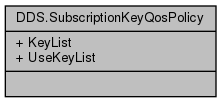 |
OpenSplice C# API
v6.x
OpenSplice C# Data Distribution Service Data-Centric Publish-Subscribe API
|
 |
OpenSplice C# API
v6.x
OpenSplice C# Data Distribution Service Data-Centric Publish-Subscribe API
|
This Proprietary QosPolicy allows the DataReader to define it's own set of keys on, the data potentially different from the keys defined on the topic. More...

Public Attributes | |
| string [] | KeyList |
| bool | UseKeyList |
This Proprietary QosPolicy allows the DataReader to define it's own set of keys on, the data potentially different from the keys defined on the topic.
By using the SubscriptionKey QosPolicy, a DataReader can force its own key-list definition on data samples. The consequences are that the DataReader will internally keep track of instances based on its own key list, instead of the key list dictated by the Topic.
Operations that operate on instances or instance handles, such as lookup_instance or get_key_value, respect the alternative key-list and work as expected. However, since the mapping of writer instances to reader instances is no longer trivial (one writer instance may now map to more than one matching reader instance and vice versa), a writer instance will no longer be able to fully determine the lifecycle of its matching reader instance, nor the value its view_state and instance_state.
In fact, by diverting from the conceptual 1 – 1 mapping between writer instance and reader instance, the writer can no longer keep an (empty) reader instance ALIVE by just refusing to unregister its matching writer instance. That means that when a reader takes all samples from a particular reader instance, that reader instance will immediately be removed from the reader’s administration. Any subsequent reception of a message with the same keys will re-introduce the instance into the reader administration, setting its view_state back to NEW. Compare this to the default behaviour, where the reader instance will be kept alive as long as the writer does not unregister it. That causes the view_state in the reader instance to remain NOT_NEW, even if the reader has consumed all of its samples prior to receiving an update.
Another consequence of allowing an alternative keylist is that events that are communicated by invalid samples (i.e. samples that have only initialized their keyfields) may no longer be interpreted by the reader to avoid situations in which uninitialized non-keyfields are treated as keys in the alternative keylist. This effectively means that all invalid samples (e.g. unregister messages and both implicit and explicit dispose messages) will be skipped and can no longer affect the instance_state, which will therefore remain ALIVE. The only exceptions to this are the messages that are transmitted explicitly using the DataWriter writedispose call, which always includes a full and valid sample and can therefore modify the instance_state to NOT_ALIVE_DISPOSED.
By default, the SubscriptionKeyQosPolicy is not used because use_key_list is set to false.
This QosPolicy is applicable to a DataReader only, and cannot be changed after the DataReader is enabled.
Definition at line 1559 of file DdsDcpsStructs.cs.
| string [] DDS.SubscriptionKeyQosPolicy.KeyList |
Definition at line 1562 of file DdsDcpsStructs.cs.
| bool DDS.SubscriptionKeyQosPolicy.UseKeyList |
Definition at line 1561 of file DdsDcpsStructs.cs.